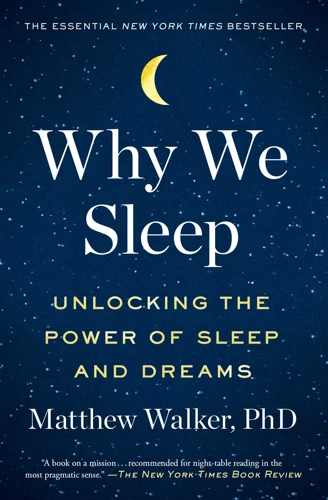Do you often struggle to get a good night’s sleep? Does the thought of exercising after a long day seem daunting? What if we told you that exercise could actually improve the quality of your sleep? It may seem counterintuitive, but numerous studies have shown that regular physical activity can lead to better sleep patterns and increased energy levels during the day. However, not all exercise is created equal when it comes to sleep. In this article, we will explore the impact of different types of exercise on sleep and provide tips on how to incorporate physical activity into your nightly routine for a more restful and rejuvenating sleep.
The Benefits of Exercise on Sleep
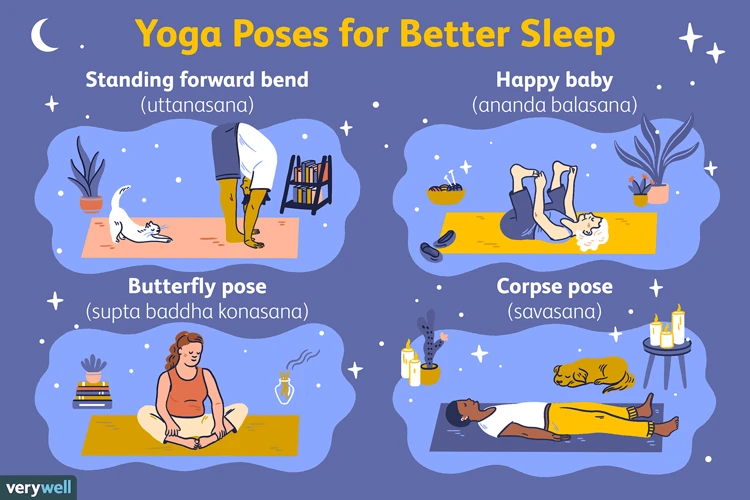
Regular exercise has numerous health benefits, including improved cardiovascular health, weight management, and increased muscle strength. However, did you know that exercise can also have a significant positive impact on your sleep quality? Research has shown that there is a strong link between exercise and better sleep.
Exercise can have several positive effects on the body, including promoting relaxation and reducing stress and anxiety. Physical activity can increase the production of endorphins, which are natural painkillers and can also improve mood and reduce stress levels. When your body temperature increases during exercise, it can also cause it to lower later on, which can help you fall asleep faster and experience deeper sleep. Exercise can also help regulate your circadian rhythm, which is the natural sleep-wake cycle that regulates your body’s biological clock.
While exercise can improve sleep, it is important to note that it can also lead to insomnia if not incorporated properly into your routine. Overexertion or exercising too close to bedtime can cause your body to release cortisol and adrenaline, which can make it difficult to fall asleep. The timing and intensity of your exercise routine can have a significant impact on your sleep quality.
Exercise has also been shown to be an effective treatment for sleep disorders such as sleep apnea and insomnia. Aerobic exercise has been found to improve symptoms of sleep apnea, while strength training can improve overall sleep quality and reduce symptoms of insomnia. Yoga is another type of exercise that has been shown to improve sleep quality and reduce symptoms of sleep problems.
Incorporating regular exercise into your daily routine can have a significant positive impact on your sleep quality. However, it is important to use caution and listen to your body to ensure that you do not overexert yourself or negatively impact your sleep. Now that we understand the benefits of exercise on sleep, let’s explore the best types of exercise for better sleep.
How Exercise Affects Sleep
It’s no secret that exercise has numerous benefits for our physical health, but did you know that it can also significantly impact our sleep quality? Regular physical activity has been shown to improve sleep patterns and overall sleep quality. But how, exactly, does exercise affect our sleep? Let’s explore the scientific research on the relationship between exercise and sleep and what it means for our nightly rest.
The Connection Between Exercise and Insomnia
Insomnia is a common sleep disorder characterized by difficulty falling asleep, staying asleep or waking up too early. While exercise has been shown to improve overall sleep quality, it may worsen Insomnia symptoms for some people.
The connection between exercise and Insomnia is complex and may be influenced by factors such as the intensity and timing of the activity, as well as individual health status and lifestyle.
Here are some possible ways that exercise may worsen Insomnia:
- Overstimulation: High-intensity workouts or workouts done too close to bedtime can lead to increased levels of arousal and make it difficult to fall asleep.
- Pain and Discomfort: Workouts that involve high impact or repetitive movements may lead to pain and discomfort that can interfere with sleep, especially in people with chronic pain conditions.
- Anxiety and Stress: While exercise can be a great way to relieve stress and anxiety, it may have the opposite effect on some people. For instance, competitive sports or challenging workouts may increase anxiety levels and contribute to insomnia symptoms.
If you have Insomnia and are concerned about how exercise may affect your sleep, it’s essential to talk to your healthcare provider. They can help you determine the best type, intensity and timing of exercise for your needs, as well as offer personalized advice on sleep hygiene and relaxation techniques to manage Insomnia symptoms.
How Exercise Can Help with Sleep Disorders
Individuals who suffer from sleep disorders such as insomnia, sleep apnea, and restless leg syndrome can benefit greatly from incorporating regular exercise into their routine. Here are some specific ways that exercise can help with different types of sleep disorders:
- Insomnia: Aerobic exercise can help reduce the time it takes to fall asleep and increase the total amount of sleep obtained. Strength training has been shown to improve sleep quality in individuals with insomnia.
- Sleep Apnea: Exercise can assist with weight loss, which in turn can decrease the severity of sleep apnea symptoms. Additionally, certain exercises such as throat and tongue exercises may strengthen the airway muscles and reduce the likelihood of airway collapse during sleep.
- Restless Leg Syndrome: Stretching and yoga may help alleviate symptoms of restless leg syndrome and improve sleep quality.
Incorporating exercise into a treatment plan for sleep disorders can have a significant positive impact on overall health and well-being. It’s important to speak with a healthcare provider to determine the most appropriate types and amount of exercise for each individual’s specific situation.
The Best Types of Exercise for Better Sleep

Regular exercise has been shown to be beneficial for improving sleep quality. However, not all types of exercise are equally effective. Here are some of the best types of exercise for better sleep:
Aerobic Exercise: Also known as cardiovascular exercise, aerobic exercise involves any activity that gets your heart rate up and makes you breathe harder. Examples include running, cycling, swimming, and brisk walking. Aerobic exercise has been shown to improve sleep quality and increase the amount of deep sleep you get.
Strength Training: Resistance training, also known as strength training, helps build muscle and improve bone density. Strength training can also lead to better sleep quality. One study found that adults who performed full-body strength training twice a week reported better sleep quality and fewer symptoms of insomnia than those who did not engage in any strength training.
Yoga: Yoga is a mind-body practice that combines physical postures, breathing techniques, and meditation or relaxation. Yoga has been shown to reduce stress and anxiety, both of which can interfere with sleep. Some studies suggest that practicing yoga can lead to better sleep quality and longer sleep duration.
It is important to note that any type of exercise can be beneficial for sleep, as long as it is performed regularly and at the right time of day. Additionally, it is important to choose an exercise that you enjoy and can stick to, as consistency is key for reaping the sleep benefits of exercise.
Aerobic Exercise
Cardio, also known as aerobic exercise, is a form of physical activity that gets your heart rate up and increases blood flow throughout your body. This type of exercise can be anything from brisk walking, running, cycling, or swimming. It is a great way to improve your overall cardiovascular health, but it can also have a positive impact on your sleep patterns. In this section, we will take a closer look at how aerobic exercise can help you get better quality sleep and how to incorporate it into your sleep routine.
Strength Training
Strength training is another beneficial type of exercise for improving sleep. Also known as resistance training, this form of exercise focuses on building muscle mass and increasing strength through the use of weights, resistance bands, or bodyweight exercises. Here are some ways that strength training can help improve your sleep:
- Improves sleep quality: Studies have shown that strength training can lead to better sleep quality, including deeper and more restorative sleep.
- Reduces sleep-disordered breathing: Strength training has been shown to improve sleep-disordered breathing, a common problem that can cause snoring and interrupted breathing during sleep.
- Reduces stress and anxiety: Along with other forms of exercise, strength training can help reduce stress and anxiety levels, leading to better sleep.
- Increases daytime energy: Regular strength training has been shown to increase daytime energy levels and reduce daytime sleepiness.
When it comes to incorporating strength training into your sleep routine, it’s important to start slow and gradually increase the intensity over time. Aim for at least two strength training sessions per week, focusing on all major muscle groups. You can use weights, resistance bands, or bodyweight exercises such as push-ups and squats.
To maximize the benefits of strength training for sleep, avoid exercising too close to bedtime, as this can lead to increased alertness and difficulty falling asleep. Instead, aim to complete your strength training session at least a few hours before bed.
It’s important to listen to your body and avoid over-exerting yourself, as this can lead to poor sleep quality and increased stress. Make sure to warm up before each session and stretch afterwards to reduce the risk of injury and muscle soreness.
By incorporating strength training into your exercise routine, you can improve your overall sleep quality and wake up feeling more rested and energized.
Yoga
Yoga is an ancient practice that has gained immense popularity in recent years. It combines physical movements, breathing exercises, and meditation to promote physical and mental well-being. Not only does yoga provide various health benefits, but it is also great for improving sleep.
Here are some ways yoga can help with sleep:
- Decreases Stress: When we feel overwhelmed or stressed, it can be difficult to fall asleep. Yoga helps to reduce stress and anxiety, promoting relaxation and better sleep.
- Promotes Relaxation: Yoga postures, or asanas, promote relaxation by releasing tension and relaxing the muscles. This helps with falling asleep faster and having a more restful sleep.
- Increases Melatonin Production: Melatonin is a hormone that regulates sleep. Certain yoga poses, such as forward bends and inversions, stimulate the pineal gland, which produces melatonin.
- Improves Breathing: Focused breathing exercises, or pranayama, can calm the mind and reduce stress, helping with better sleep.
Some yoga poses that are particularly beneficial for sleep include:
- Child’s Pose: This pose is great for relaxing the body and reducing stress. It stretches the back, hips, and thighs while also calming the mind.
- Forward Fold: Forward folds help to release tension in the neck and shoulders, promoting relaxation. They also improve circulation and stimulate the nervous system.
- Legs Up the Wall: This pose helps to reduce stress and anxiety, as well as increase circulation. It also helps to reduce swelling in the legs and feet.
When practicing yoga for better sleep, it’s important to:
- Practice regularly to see the best results. Aim for at least 3 times a week.
- Avoid practicing too close to bedtime, as the increased energy from the practice may keep you awake.
- When doing yoga before bed, focus on slower, more relaxing poses to prepare the body and mind for sleep.
Incorporating yoga into your exercise routine can have many benefits, including better sleep. By reducing stress, promoting relaxation, and improving breathing, yoga helps to create optimal conditions for restful and rejuvenating sleep.
How to Incorporate Exercise into Your Sleep Routine
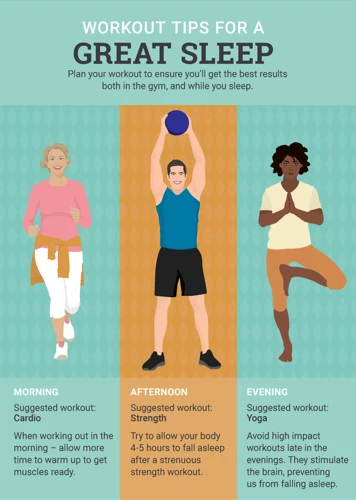
Exercise has numerous benefits for better sleep, but many people struggle with finding the time and energy to incorporate it into their daily sleep routine. However, with some planning and commitment, it can be easy to add exercise to your sleep schedule.
The Best Time to Exercise for Good Sleep
Firstly, it is important to choose the right time of day to exercise. Exercising too close to bedtime can lead to difficulty falling asleep, as it can increase alertness and heart rate. It is best to exercise at least a few hours before bed, giving the body enough time to wind down and relax before sleep.
How Long to Exercise for Better Sleep
The amount of exercise needed for better sleep varies depending on the individual, but studies suggest that moderate-intensity exercise for at least 30 minutes per day, at least five times per week, can improve sleep quality. However, even short bouts of exercise can be beneficial for those who struggle to find time in their schedule.
Other Tips for a Better Sleep Routine
Incorporating exercise into your sleep routine can also involve making other lifestyle changes that promote better sleep. These include maintaining a regular sleep schedule, creating a relaxing bedtime routine, and avoiding stimulating activities such as watching TV or using electronic devices before bed. Creating a comfortable sleep environment, such as a cool and dark bedroom with comfortable bedding, can also help promote better sleep.
The Role of Diet in Exercise and Sleep
Diet can also play a role in exercise and sleep. Eating a healthy diet that includes a variety of fruits, vegetables, lean proteins, whole grains, and healthy fats can provide the energy needed for exercise and promote better sleep. Avoiding heavy and spicy meals before bed can also help prevent discomfort and promote sleep.
Incorporating exercise into your sleep routine can have numerous benefits for sleep quality and overall health. Planning exercise at the right time of day and for the right duration, making other lifestyle changes, and maintaining a healthy diet can all contribute to better sleep.
The Best Time to Exercise for Good Sleep
It’s no secret that exercise is beneficial for a good night’s sleep. However, what many people don’t know is that the timing of the exercise can make all the difference. If you’re struggling with getting restful sleep, you may want to consider adjusting the time of day that you work out. Studies have shown that exercising at certain times can affect your sleep quality in different ways. So, when is the best time to exercise for good sleep? Let’s explore some options and their potential impacts.
How Long to Exercise for Better Sleep
Regular exercise can have a significant impact on the quality and duration of sleep. However, it’s important to find a balance and not overdo it, as over-exercising can have the opposite effect and lead to poor sleep. So, how long should you exercise for better sleep?
The Amount and Intensity of Exercise
The amount and intensity of exercise needed to improve sleep can vary depending on individual factors such as age, fitness level, and overall health. However, in general, experts recommend that adults aim for at least 150 minutes of moderate aerobic exercise or 75 minutes of vigorous aerobic exercise per week for better sleep.
The Duration of Exercise per Session
When it comes to duration, research suggests that it’s better to opt for shorter, more frequent sessions of exercise throughout the week rather than longer sessions less frequently. A study published in the journal Sleep Medicine found that women who exercised for 30 minutes in the morning three times a week for 16 weeks saw significant improvements in sleep quality compared to those who exercised less frequently or for shorter durations.
| Frequency | Duration per Session | Total Duration per Week |
|---|---|---|
| 3 times a week | 30 minutes | 90 minutes |
| 5 times a week | 20 minutes | 100 minutes |
| 7 times a week | 15 minutes | 105 minutes |
The Best Time to Exercise for Better Sleep
While there’s no one-size-fits-all answer to the question of when to exercise, research suggests that working out in the morning or early afternoon is generally better for sleep than exercising later in the evening. This is because exercise raises the body’s core temperature, which can interfere with the body’s natural sleep rhythms.
To Summarize
When it comes to exercise and better sleep, it’s important to find the right balance for your individual needs. Aim for at least 150 minutes of moderate aerobic exercise or 75 minutes of vigorous aerobic exercise per week, and opt for shorter, more frequent sessions rather than longer sessions less frequently. Additionally, try to exercise earlier in the day and avoid working out late in the evening to avoid interfering with your body’s natural sleep rhythms.
Other Tips for a Better Sleep Routine
There are several other tips that can help improve your sleep routine, in addition to exercise. Some of these tips include:
- Limiting caffeine and alcohol intake: Consuming caffeine and alcohol in the evening can make it harder to fall asleep and stay asleep. It’s best to avoid these substances in the hours before bed.
- Creating a relaxing bedtime routine: Incorporating a relaxing routine before bed can help signal to your body that it’s time to sleep. This could include reading a book, taking a warm bath, or doing some gentle stretching.
- Keeping a consistent sleep schedule: Going to bed and waking up at the same time every day can help regulate your body’s internal clock and improve the quality of your sleep.
- Avoiding electronics before bed: The blue light emitted by electronic devices can disrupt your body’s natural sleep-wake cycle. It’s best to avoid using electronics for at least an hour before bed.
- Creating a sleep-conducive environment: Your bedroom should be cool, dark, and quiet to promote good sleep. Investing in a comfortable mattress and pillows can also make a big difference.
- Managing stress: Stress and anxiety can interfere with sleep. Finding ways to manage stress, such as through meditation or therapy, can improve the quality of your sleep.
Implementing these tips, in conjunction with regular exercise, can lead to significant improvements in the quality and duration of your sleep.
How Much Exercise is Too Much?
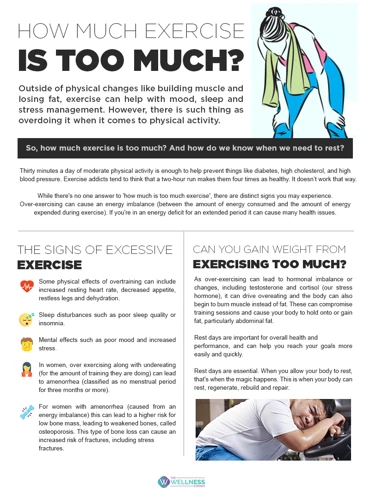
Engaging in regular exercise is crucial for promoting better sleep. It is important to note, however, that too much exercise can actually have a negative impact on your sleep. Over-exercising can cause both physical and mental stress on the body, leading to difficulty falling asleep or staying asleep throughout the night.
When you engage in high-intensity exercises, especially close to bedtime, your body produces adrenaline and cortisol, which are stress hormones that can keep you awake. These hormones trigger the “fight or flight” response, which can make it difficult to calm down and relax enough to fall asleep.
Over-exercising can lead to physical fatigue and muscle soreness, which can make it uncomfortable to find a comfortable sleeping position. This can lead to a restless night’s sleep, leaving you feeling groggy and tired the next day.
It is important to note that the amount of exercise that is considered “too much” can vary from person to person. Factors such as age, fitness level, and overall health should be considered when determining how much exercise is appropriate for you.
To avoid over-exercising, it is recommended that you gradually increase the intensity and duration of your workouts. Additionally, it is important to listen to your body and take rest days as needed to avoid burnout and injury.
As a general rule, it is recommended that adults engage in at least 150 minutes of moderate-intensity exercise or 75 minutes of vigorous-intensity exercise per week. This can be broken down into smaller increments throughout the week, such as 30 minutes of exercise five days per week.
Ultimately, finding a balance between exercise and rest is key to promoting better sleep. By listening to your body and being mindful of your physical and mental well-being, you can create a sustainable exercise routine that promotes both physical fitness and healthy sleep habits.
The Connection Between Over-Exercising and Poor Sleep
It’s a common misconception that the more you exercise, the better quality of sleep you’ll get. However, over-exercising can actually have the opposite effect and lead to poor sleep.
The body needs time to recover: When you exercise, you’re breaking down muscle fibers and causing small amounts of damage. The body needs time to recover and repair this damage, and if you don’t give it that time, it can lead to fatigue, decreased performance, and poor sleep.
The stress response: Over-exercising can also trigger the body’s stress response, which can cause an increase in cortisol levels. Increased cortisol levels can make it difficult to fall asleep and stay asleep.
Disrupting your circadian rhythm: When you over-exercise, you may be disrupting your body’s natural circadian rhythm. This can cause a shift in the timing of when you feel alert and when you feel tired, leading to poor sleep.
It’s important to listen to your body and give it the rest and recovery it needs after exercise. If you’re experiencing difficulty sleeping and think it’s related to over-exercising, try scaling back your workouts and see if that improves your sleep quality.
Exercising for Better Sleep: Tips and Tricks
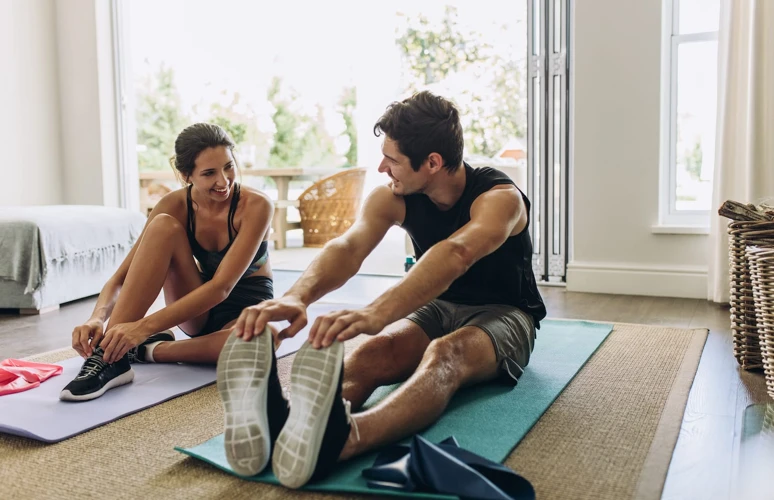
Regular exercise has been found to have numerous benefits for promoting good sleep. However, it can be challenging to stick to a consistent exercise routine, so here are some tips and tricks to help you stay on track:
Tracking Your Exercise and Sleep
One effective way to monitor your exercise and sleep habits is by using a fitness tracker or mobile app. This will allow you to track your daily physical activity, monitor your sleep patterns, and provide valuable insights into how to improve both.
Staying Motivated to Exercise for Better Sleep
It can be easy to make excuses to skip exercise, but there are ways to stay motivated. One effective strategy is to set realistic goals and keep a visual reminder of them. Whether that is a motivational picture or an inspiring quote, having a daily reminder of your goals can help keep you focused and motivated.
Other Lifestyle Changes to Promote Better Sleep
In addition to starting an exercise routine, other lifestyle changes can help to promote better sleep. This includes creating a relaxing bedtime routine, maintaining a consistent sleep schedule, and ensuring your sleeping environment is quiet, dark, and cool. Cutting back on caffeine and alcohol consumption, particularly before bedtime, can also help to promote better sleep.
Taking the time to regularly exercise and making positive lifestyle changes can lead to improved sleep quality and overall quality of life. So, whether you prefer high-intensity workouts or yoga, find an exercise routine that works for you, and enjoy the benefits of good sleep.
Tracking Your Exercise and Sleep
If you’re looking to improve your sleep quality through exercise, tracking your progress can be a helpful way to stay motivated and monitor your results. By keeping a record of your exercise routine and your sleep patterns, you can gain insight into how different types of exercise impact your sleep and adjust your routine accordingly. Let’s explore some tips and tricks for tracking your exercise and sleep.
Staying Motivated to Exercise for Better Sleep
Maintaining a regular exercise routine can be challenging, but it is crucial for improving sleep quality. Staying motivated to exercise for better sleep requires setting achievable goals and finding activities that are enjoyable. Here are some tips for staying motivated:
| TIPS | EXPLANATION |
|---|---|
| Find an Exercise Buddy | Partnering with a friend or family member to exercise can be fun and keep you accountable for your routine. It also provides an opportunity to socialize and bond with others. |
| Set Realistic Goals | Start with small, achievable goals, such as walking for 30 minutes a day. Gradually increase the intensity and duration of your exercise routine to prevent burnout or injury. |
| Track Your Progress | Using a fitness app or journal to record your exercise routine and sleep quality can help you see your progress and stay motivated. |
| Vary Your Routine | Doing the same exercise routine every day can become boring. Try new activities, such as swimming or dance classes, to keep your routine interesting. |
| Reward Yourself | Celebrate your accomplishments by giving yourself a reward, such as a massage or a new workout outfit. |
Remember, staying motivated to exercise for better sleep is not just about physical health, but also mental wellness. Finding activities that you enjoy and fit into your lifestyle can lead to a more positive outlook and improved sleep quality.
Other Lifestyle Changes to Promote Better Sleep
Making lifestyle changes to promote better sleep is important when it comes to getting the most out of your exercise routine. Here are some other lifestyle changes you can make to improve your sleep:
- Establishing a bedtime routine: Going to bed and waking up at the same time every day helps regulate your body’s sleep-wake cycle. This can make it easier to fall asleep and wake up feeling refreshed.
- Avoiding screens before bed: The blue light emitted by electronic devices can interfere with your body’s production of melatonin, a hormone that helps regulate sleep. Avoiding screens for at least an hour before bed can help improve your sleep quality.
- Creating a sleep-conducive environment: Keep your bedroom dark, quiet, and cool to promote better sleep. Use blackout curtains, earplugs, or a white noise machine if necessary.
- Reducing stress: High levels of stress can make it difficult to fall asleep and stay asleep. Practice relaxation techniques such as deep breathing, meditation, or yoga to reduce stress and promote better sleep.
- Avoiding caffeine and alcohol: These substances can disrupt sleep by affecting your body’s natural sleep cycle. Try to avoid consuming caffeine after lunchtime and limit alcohol intake, especially before bed.
- Getting regular exposure to natural light: Exposure to natural light, especially in the morning, can help regulate your body’s sleep-wake cycle. Try to spend time outside during the day or consider using a light therapy box if you don’t get enough natural light.
Incorporating these lifestyle changes alongside regular exercise can significantly improve your sleep quality and overall well-being. Remember, a consistent sleep routine and healthy habits are the key to a good night’s sleep.
The Role of Diet in Exercise and Sleep
The food we consume plays a significant role not only in maintaining our physical health but also in improving our sleep quality. A diet that is rich in essential nutrients can help improve the quality and quantity of sleep. On the other hand, eating the wrong type of food can have adverse effects on our sleep.
Foods to Eat for Better Sleep: Certain foods contain essential nutrients that promote better sleep. These include foods that are high in magnesium, tryptophan, potassium, calcium, and melatonin. Magnesium, found in foods such as almonds, spinach, and peanuts, has a calming effect on the nervous system, which can lead to better sleep. Tryptophan, which is found in foods such as turkey, eggs, and cheese, is a precursor to serotonin, a neurotransmitter that helps regulate sleep. Foods that are high in potassium, such as bananas and sweet potatoes, can help relax muscles and promote better sleep. Calcium-rich foods like leafy green vegetables, dairy products, and fortified plant milks can also improve sleep quality. Melatonin, a hormone that regulates the sleep-wake cycle, can be found in foods such as tart cherries, almonds, and kiwis.
Foods to Avoid Before Bed: Just as there are foods that can promote better sleep, there are also foods that can hinder it. Foods that are high in sugar and caffeine can interfere with sleep, as they are stimulants that can keep the brain active. Spicy or heavy meals can cause indigestion and heartburn, making it difficult to fall asleep. Alcohol, while initially causing drowsiness, can also disrupt sleep later in the night. It is recommended to avoid these types of foods for at least a few hours before bedtime.
Incorporating a healthy diet into your exercise routine can have a significant impact on your sleep quality. By eating foods rich in essential nutrients, you can promote better sleep and feel more rested and refreshed in the morning. Conversely, avoiding certain foods before bed can help reduce the likelihood of sleep disturbances. Remember, a healthy diet and regular exercise regime go hand in hand to ensure a good night’s sleep.
Foods to Eat for Better Sleep
Eating the right foods can have a major impact on the quality of your sleep. It’s important to choose foods that promote relaxation and calmness in the body, while avoiding those that can interfere with sleep. If you’re struggling with sleep, consider incorporating some of these nutritious foods into your diet to help promote better sleep.
Foods to Avoid Before Bed
It’s important to be mindful of what we eat before bed since certain foods can interfere with our sleep. Here are some foods to avoid before bedtime:
- Spicy foods: Spicy foods can cause heartburn and indigestion, which can make it difficult to fall asleep and stay asleep.
- High-fat foods: Foods high in fat take longer to digest, which can cause discomfort and indigestion throughout the night.
- Caffeine: It’s common knowledge that caffeine can interfere with sleep. Avoid consuming any caffeine-containing foods or drinks in the hours leading up to bedtime.
- Alcohol: Although alcohol can initially make you feel drowsy, it actually negatively affects the quality of your sleep. It reduces the amount of time spent in deep, restorative sleep and increases the likelihood of waking up during the night.
- Sugar: Foods high in sugar can cause blood sugar spikes and crashes, which can disrupt sleep.
By avoiding these foods before bed, you can help promote a more restful night’s sleep.
Conclusion
In conclusion, exercise has been shown to have a positive impact on sleep quality and can be an effective tool for those struggling with insomnia or other sleep disorders. However, it is important to pay attention to the types of exercise one engages in and the timing of those workouts in order to maximize the benefits of exercise on sleep.
Aerobic exercise has been found to be particularly beneficial for improving sleep quality, as it helps to regulate the body’s circadian rhythms and reduce stress. Strength training can also be effective, but it should be done earlier in the day to avoid disrupting the body’s natural sleep cycle. Yoga is another great option for promoting relaxation and reducing anxiety before bed.
When incorporating exercise into a sleep routine, it’s important to find a time that works best for you. For some, working out in the morning may be most effective, while others may prefer to exercise in the afternoon or early evening. It’s also important to not overdo it, as over-exercising has been linked to poor sleep quality.
Other lifestyle changes, such as avoiding caffeine and alcohol before bed, can also help to improve sleep quality. Additionally, incorporating foods that are high in tryptophan, such as turkey and bananas, can also help promote better sleep.
Overall, exercise can be a powerful tool for improving sleep quality, but it’s important to engage in the right types of exercise at the right time and in moderation. Making other lifestyle changes, such as paying attention to diet and reducing stress, can also help to maximize the benefits of exercise on sleep.
Frequently Asked Questions
Can exercise really improve sleep quality?
Yes, regular exercise can improve sleep quality by increasing the time spent in deep sleep, reducing the time to fall asleep, and decreasing the number of awakenings during the night.
What type of exercise is best for improving sleep?
Aerobic exercise, strength training, and yoga have all been shown to improve sleep quality, so it’s best to find an activity that you enjoy and can incorporate into your routine.
When is the best time to exercise for better sleep?
The best time to exercise for better sleep may vary from person to person, but generally it’s best to avoid exercising close to bedtime as it may actually interfere with sleep. Ideally, you should aim to finish exercising at least a few hours before bedtime.
How long should I exercise for to improve my sleep?
Research suggests that exercising for at least 30 minutes a day, five days a week can help improve sleep quality. However, even shorter bouts of exercise can be beneficial, so it’s better to do some exercise than none at all.
Can over-exercising affect sleep quality?
Yes, over-exercising can actually have negative effects on sleep quality, as it can lead to increased levels of stress hormones and overuse injuries.
What are some other lifestyle changes that can promote better sleep?
Other lifestyle changes that can promote better sleep include establishing a regular sleep schedule, practicing relaxation techniques before bed, avoiding caffeine and alcohol close to bedtime, and creating a relaxing sleep environment.
Can diet really impact sleep quality?
Yes, diet can have a significant impact on sleep quality. Eating a balanced diet that is rich in vitamins and minerals as well as avoiding large meals close to bedtime can both promote better sleep.
Can exercising outdoors have different effects on sleep than indoors?
Research suggests that exercising outdoors may have different effects on sleep than exercising indoors. Exposure to natural light may help regulate your body’s sleep-wake cycle, and exercising outdoors may also be more enjoyable and less stressful than exercising indoors. However, it’s important to take safety precautions and protect yourself from the elements.
Can exercise help with sleep disorders like sleep apnea?
Yes, exercise has been shown to help with sleep apnea by improving muscle tone in the throat and reducing excess weight that can contribute to the condition. However, it’s important to talk to your doctor before starting an exercise program if you have sleep apnea.
How can I track my exercise and sleep to monitor progress?
There are many apps and devices available that can track your exercise and sleep patterns, such as fitness trackers and sleep monitors. Keeping a journal or log can also be a helpful way to track progress and identify patterns that may be affecting your sleep quality.

